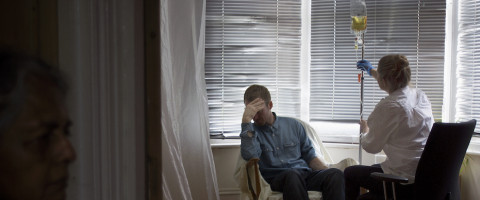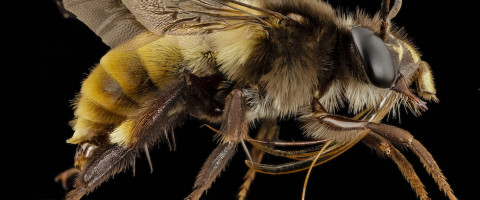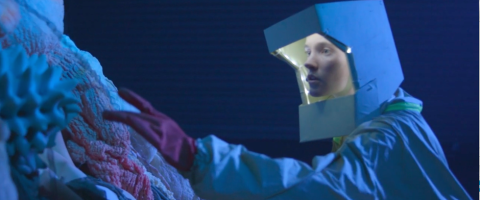When she was brand-new, she was formless, as all infants are. Her face was ruddy and pocked with white pustules, her downy head ovoid, malleable to pressure. I named her Pythia, after my mother.
“She has your eyes,” the technician said, when Pythia and I woke. I beamed through the chemical haze.
There were no real complications, so we went home soon after the birth procedure, me with sutures in unmentionable places, her with an umbilical cord in a raw knot. The house had been cleaned; part of the package, a sanitizing overhaul courtesy of GeneTech. Everything had been restored to factory settings. Even the photographs on my mantelpiece were straightened—my mother on her wedding day, and then again a few years before her death, striking a cavalier pose on the beach, holding me bundled in some hopeless sarong. The counters were spotless, and Pythia’s room had been stocked with everything a new parent could need: nutrient sensors, a HEPA-vac, a full library of children’s content.
Even with all of this, it’s not easy—a baby—without a partner in the adventure, especially in those first few months. Neither of us slept much. Pythia had her namesake’s riotous insomnia, and so did I.
But I was grateful, at my age, and alone, for this child. My miracle beyond the ordinary miracles of biology.
Pythia is speaking now, in a strange nattering stream. She is a little being mapping the world with sound, her wet mouth in constant motion. Sometimes she chirps, inquisitively, like an old cat. She can say “Mommy,” and does, although she seems to direct the word towards anything animate, including herself.
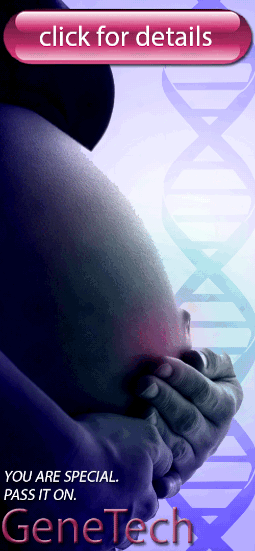 I asked Pythia to show me the moon and she just fell to the ground and started digging in the dirt run behind the house. We may have sired a poet, me and GeneTech, Inc., who I’m just realizing have stopped sending me their monthly checkup alerts. Fairly certain the warranty extends until Pythia is ten. Longer than most genetics labs, presumably because of their methods, which I was assured had been vetted by teams of clinicians beyond a mathematical iota of doubt. A zygote crafted from DNA and memories, a little seed, an information bomb, planted in my womb.
I asked Pythia to show me the moon and she just fell to the ground and started digging in the dirt run behind the house. We may have sired a poet, me and GeneTech, Inc., who I’m just realizing have stopped sending me their monthly checkup alerts. Fairly certain the warranty extends until Pythia is ten. Longer than most genetics labs, presumably because of their methods, which I was assured had been vetted by teams of clinicians beyond a mathematical iota of doubt. A zygote crafted from DNA and memories, a little seed, an information bomb, planted in my womb.
What did Nanette, the technician, say? “The best of you,” smiling as she pulled a string of electrodes off my skull, each popping like the suckers of a tentacle, “and none of the rest of you!” My little Pythia, everything I am, and everything I’ve always wanted to be.
Siri, remind me to ping them when I have a moment.
You know—it’s not my eyes that Pythia has, it’s Mom’s. Down to the flecks of yellow-gold ringing her right iris. Of course, the originals are long gone, and the wedding photo on my mantel is analogue so I can’t just boost it and see. Still I can’t shake the sense, looking at Pythia, that Mom is there behind her eyes. I wish she could have met the kid, who I sometimes catch alone in her room, with all the sternness of a schoolmistress, reprimanding her toys. I don’t know where that comes from. She could use a grandmother, if only for levity.
GeneTech went out of business, incidentally, six months ago. I’m having a hell of time finding out why, although my efforts have led me, circuitously, to a support group for GeneTech families. We do a weekly group chat, mostly single moms who took the risk because they wanted control. The others walked me through how to do the haptic tests on Pythia by myself; I had to special-order a few tools, but otherwise you don’t need to know much.
She checks out, to my relief—all motor activity is within the normal range and her development is progressing along with the charts they gave me when she was born. She responds to light and sound, especially music. She likes old songs, Motown and showtunes. Standards. When I play her Nina Simone, she throws her head back and hums deeply, as though she is trying to make her little body resonate with the timbre of that long-dead voice. You know, I’m just gonna keep updating this progress log, even though there are no technicians left at GeneTech to assess them for abnormalities. It does me good, and Pythia can read it when she’s older.
Mom loved Nina Simone too.
Warranty or no warranty, Pythia is ten now. She is leggy and longhaired; prone to the same antics as any thoughtful child, always dreaming, solitary, wise beyond her decade, and curious. She’s interested in the past, and watches old movies the way I watched science fiction at her age, full of wonder. She’s baffled and frightened by the details of everyday life before her time—how people moved around the city at the wheels of machines called Plymouth, Oldsmobile, Ferrari, or Hyundai. How they waited by telephones, and how they trusted the police. How some lived on the streets and died.
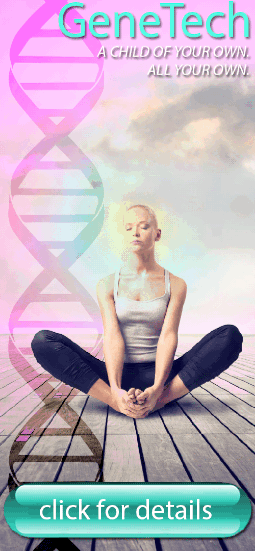 The idea that someone could be lost and not immediately found seems to terrify her most. That you could plan to meet someone in a train station, say, and just miss them, or pass your beloved in a crowd unnoticed. That a man could go to work in the morning and nobody—none of the women and children in the house who waited behind—could know for certain if that’s where he was really going. Or if he would ever come home.
The idea that someone could be lost and not immediately found seems to terrify her most. That you could plan to meet someone in a train station, say, and just miss them, or pass your beloved in a crowd unnoticed. That a man could go to work in the morning and nobody—none of the women and children in the house who waited behind—could know for certain if that’s where he was really going. Or if he would ever come home.
It’s strange. I was afraid of the same things. Especially after Mom did just that, leaving me with nothing but old photographs and a set of hazel eyes.
Anyway, Pythia’s into “retro.” She wants one of those throwback iPhones for Christmas. They’re as bulbous and handheld as the old ones, although of course the insides are stuffed with all the requisite components for living—trackers, HealthSensors, built-in Snap Kinématics. I ordered one from Amazon and when the drone dropped it into my palm I couldn’t believe how heavy it was. Did I ever really lug something like this around every day? It’s wonderful how children make you reexamine the past.
Thank God for the GeneTech support group. Adolescence has struck this household like a firestorm. I’ve never kept anything secret from Pythia, especially not her origins, which I’ve been clear about since she was old enough to ask after a father. I’ve told her again and again:
Pythia, you come from me alone, you’re braided from my genetics and my memories, even my hopes for how a person should be. I made you because the world needed you, P, and I made you in my image, or close to it, because I was alone in this world.
But now she’s fifteen and she wields my words at me like a knife. She takes every opportunity to remind me of my selfishness, and of her resentment that she must bear the brunt of my genetic hopes. A few days ago, we had a scene in the kitchen:
“Pyth,” I said. I was processing the week’s Soylent—which even with the blender I’m known to make a mess of, the fine nutrient dust settling in a mist on everything—“I wonder if you could give me a hand.”
“With the Soylent?”
“No, this weekend—with Poppy.”
I swear she groaned, although I did run the blender at that moment. “I don’t want to go back there anymore.”
Poppy, that is to say my father, is alive in a way that is mostly semantic. Funerary emulators bridged the river between life and death long before Pythia was born. I don’t feel particularly close to the hodgepodge of machinery and lights rigged into his gravestone; nor do I feel comforted by the uncanny synthesized voice booming from its general direction. His mind is half-uploaded, conversationally frozen in the year of his death. When she was younger, Pyth used to love chatting with Poppy; she asked him how fax machines worked, about swimming, about war. Retro.
“It’s not optional, missy. He’s your grandfather.”
She clicked out of an interface stupor to look up at me. “Is he?”
“As much as I’m your mother.”
“Oh, okay,” she snorted. “So no relation.”
I keep trying to tell her the reason she feels unnatural is because she’s fifteen, not because she’s a genetic hybrid. But she won’t hear me. She finally acquiesced to seeing her grandfather. She was mute with anger for the whole trip, weighing down into her seat in invisible protest, but we checked into the complex without incident.
In fact, the gravestone recognized her. I mean, it scanned her face and said “Pythia,” out loud, even though it’s never done that before. I think the cemetery must have finally upgraded the AI by a generation—at least—to accommodate for family members born after the deaths of its tenants. The Sino-Android community has been after the board for a while. Ancestor worship and all.
Something about the visit kicked Pythia from her teenage snit; she spent hours in the consultation room with Dad. When she came out, she wouldn’t look me in the eye. But I caught her smiling in the window of the train.
When did I first realize that Pythia was born twice? First in 1952, a baby that crawled out of her crib and never stopped until she was in the heart of the city at seventeen, poor and happy in a sleeping bag eating tinned beans in an empty apartment. A baby that fell in love young, married, danced on the beach in Greece, loved Nina Simone. Alive, and fiercely—until she wasn’t.
And then again in 2023, this time as the only child of her only daughter. Over the last six years my eyes have started failing me, but I don’t need them. She has mom’s voice. Her laugh. She has mom’s gait, and every time she leaves I’m transported to the last day I saw mom, walking out the front door of the house and straight into the path of a speeding world that took her from us.

Everyone is made of memories and molecules. But what do we pass down to our children? Our genes, yes, and the freedom to become a person, to press the world into their retinas and make memories they can handle until they become souvenirs of the act of remembering, their lives laced with the wild majesty of choice. The scientists who calved my daughter from me will never know what they did.
Pythia checked Poppy out of the funerary park as soon as she turned eighteen. His whole installation lives with her in an apartment on the river, east of here. I visit my parents as often as I can.

